Company scrip
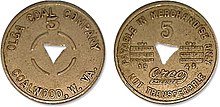
| Part ofa serieson |
| Numismatics the study of currency |
|---|
 |
Company scripisscrip(a substitute for government-issuedlegal tenderorcurrency) issued by acompanytopayits employees. It can only be exchanged incompany storesowned by the employers.[1][2][3]In theUnited Kingdom,suchtruck systemshave long been formally outlawed under theTruck Acts.In the United States, payment in scrip became illegal in 1938 as part of theFair Labor Standards Act.[4]
In theUnited States,miningandlogging campswere typically created, owned and operated by a single company.[5]These locations, some quite remote, were often cash poor;[1][2][3]even in ones that were not, workers paid in scrip had little choice but to purchase goods at a company store, as exchange into currency, if even available, would exhaust some of the value via the exchange fee. With this economicmonopoly,the employer could place largemarkupson goods, making workers dependent on the company, thus enforcing employee "loyalty".[5][6]While scrip was not exclusive to the coal industry, an estimated 75 percent of all scrip used was by coal companies in Kentucky, Virginia, and West Virginia.[7]Because of this, many derived nicknames for the type of currency originated in the Appalachian mining communities, such as "Flickers," "Clackers," and "Dugaloos."[8]
Tokens were made out of a variety of metals, including brass, copper, zinc, and nickel.[8]There were additionally "compressed fibre" coins produced during World War II in an effort to conserve metals for wartime production in direct defiance of the law passed in 1938.[8]
Lumber company scrip
[edit]In 19th century United States forested areas, cash was often hard to come by.[1][2][3]This was particularly true inlumber camps,where workers were commonly paid in company-issued scrip rather than government issued currency.[3]
InWisconsin,for example, forest-products and lumber companies were specifically exempted from the state law requiring employers to pay workers' wages in cash.[3]Lumber and timber companies frequently paid their workers in scrip which was redeemable at the company store. Company-run stores served as a convenience for workers and their families, but also allowed the companies to exploit workers for increased profit. In certain cases, employers included contract provisions requiring employees to patronize the company stores. Employees who wanted to change their scrip to cash generally had to do so at a discount.[3][5]
Lumber company scrip was redeemable in lumber as well as other merchandise. According to the Wisconsin Historical Society, such an option may have appealed to new settlers in the region, who worked in the lumber camps in winter to earn enough money to establish a farm. Taking some of their wages in lumber may have helped them build a much-needed house or barn.[3]
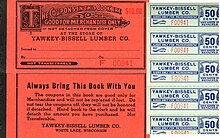
Coal company scrip
[edit]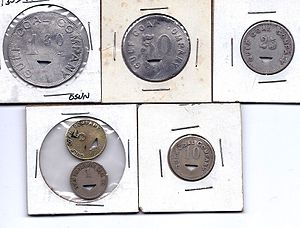
Coal scripis "tokens or paper with a monetary value issued toworkersas an advance onwagesby the coal company or its designated representative ".[9]As such, coal scrip could only be used at the specific locality orcoal townof the company named. Because coal scrip was used in the context of a coal town, where there were usually no other retail establishments in that specific remote location, employees who used this could only redeem their value at that specific location.[10]As there were no other retail establishments, this constituted amonopoly.The coal town was established by out-of-state corporations and fueled by cheap labor provided by European immigrants who came to Appalachia in search of work in the growing coal industry.[11]
The use of coal scrip dates to the late 1800s as coal companies looked for a way to increase their profits (although the stated reason for using scrip was to eliminate keeping large cash reserves).[11]Rather than receiving compensation in United States currency, many miners received payment entirely in scrip, which could be used only at a store owned by the coal company (called a company store).[12]Coal companies would also advance miners their wages in scrip, but would pay from 50% to 80% of their wages for such advances (a form of early payday loans). The result was a situation in which miners were perpetually in debt to their employer, receiving only an "advance against unearned wages."[13]Moreover, because the company store was often the only place to spend scrip, the company could charge exorbitant prices in these rural communities compared to prices in major cities.[14]
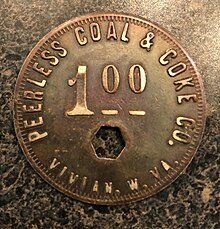
There was no uniform design, but each coin generally identified the location of the coal company town and predominantly featured the words "non-transferrable" to communicate to recipients it could not be transferred for U.S. currency.[12]
Coal scrip was deemed unconstitutional if non-transferable in the early twentieth century, but continued to exist in Kentucky and West Virginia until officially outlawed by Congress in 1967.[15][16]
The country musicianMerle Travis,on the albumFolk Songs of the Hills,makes reference to coal scrip in the song "Sixteen Tons",made famous byTennessee Ernie Ford.
Wartime
[edit]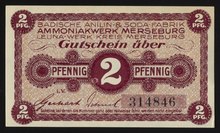
From 1914 to 1924, during and following theFirst World War,a variety of forms of German scrip were issued, includingNotgeld,Lagergeld, Gutscheine and Serienscheine. Such currencies were issued "by principalities, German colonial governments, cities, large corporations, small businesses, prisoner-of-war camps, and in some cases, individuals."[17]
Modern practice
[edit]The practice has been documented as recently as 2019. On September 4, 2008, theMexican Supreme Court of Justiceruled that Walmart de Mexico, the Mexican subsidiary ofWalmart,must cease paying its employees in part with vouchers redeemable only at Walmart stores.[18]On May 21, 2019,The Washington Postpublished an article highlightingAmazon's new system of "gamification",which rewards employees who complete high numbers of orders with Swag Bucks in a game-like system, which can then be used to buy Amazon-themed merchandise.[19]
Microtransactions(mtx) are abusiness modelwhere users can purchase in-gamevirtual currencywithmicropayments.Microtransactions are often used infree-to-playgames to provide a revenue source for the developers. While microtransactions are a staple of themobile appmarket, they are also seen on PC software such asValve'sSteamdigital distribution platform, as well as console gaming, where the consumer cannot generally convert the purchases back into real money.[20][21]
See also
[edit]References
[edit]- ^abcGinsburg, David (2006)."Chapter 2: How Gold Coins Circulated in 19th Century America".In Winter, Douglas (ed.).Gold Coins of the New Orleans Mint: 1838-1909.Zyrus Press.ISBN9780974237169.
- ^abc Taylor, George Rogers (1951).The Transportation Revolution, 1815–1860.New York, Toronto: Rinehart & Co. pp.133,331–4.ISBN978-0-87332-101-3.
- ^abcdefg"Lumber Company Scrip".Wisconsin Historical Society. January 24, 2008.
- ^"29 CFR § 531.34 - Payment in scrip or similar medium not authorized".LII / Legal Information Institute.
- ^abcGreen, Hardy (2010).The Company Town: The Industrial Edens and Satanic Mills That Shaped the American Economy.Basic Books.ISBN9780465022649.
- ^Gibson, Ella (August 1, 2014)."Episode 25 Company Scrip".A History of Central Florida Podcast.RetrievedJanuary 27,2016.
- ^"Scrip - Coal Company Tokens | Company Store Scrip".2014-06-13.Retrieved2020-10-03.
- ^abcWilson, John Freddie (2006)."Coal Mine Scrip".sites.rootsweb.com.Archivedfrom the original on 2020-11-11.Retrieved2021-06-17.
- ^Edkins, Donald (2002).Edkins Catalogue of United States Coal Company Scrip Volume 2 West Virginia.Huntington, West Virginia: The National Scrip Collectors Association. p. xxvii.ASINB0006E5ZQY.
- ^Edkins, p. xxviii
- ^ab"WVGES Geology: History of West Virginia Coal Industry".www.wvgs.wvnet.edu.Retrieved2020-10-03.
- ^ab"Company Store Scrip".Appalachian History.2018-09-28.Retrieved2020-10-03.
- ^Fishback, Price V. (December 1986)."Did Coal Miners" Owe Their Souls to the Company Store "? Theory and Evidence from the Early 1900s".The Journal of Economic History.46(4): 1011–1029.doi:10.1017/s0022050700050695.ISSN0022-0507.
- ^"Company Towns: 1880s to 1935".Social Welfare History Project.2015-08-13.Retrieved2020-10-03.
- ^National Park Service."Scrip-A Coal Miner's Credit Card - Big South Fork National River & Recreation Area (U.S. National Park Service)".www.nps.gov.Retrieved2020-10-03.
- ^Guilford, Gwynn (30 December 2017)."The 100-year capitalist experiment that keeps Appalachia poor, sick, and stuck on coal".Quartz.Retrieved2020-10-03.
- ^"German and European money and scrip used during and after the first World war, 1914-1924".Library of Congress.Retrieved30 March2020.
- ^"Court outlaws Wal-Mart de Mexico worker vouchers".Reuters.Sep 5, 2008.Retrieved18 June2021.
- ^Bensinger, Greg (May 21, 2019)."MissionRacer: How Amazon Turned Tedium Warehouse Work Into Game".The Washington Post.Retrieved22 May2019.
- ^Chandler, Heather Maxwell (2020).The Game Production Toolbox.Boca Raton, Fla.: CRC Press. p. 18.ISBN978-0-429-80178-5.
- ^Ivanov, M.; Wittenzellner; Washboard, M. (2019)."Video game monetization mechanisms in triple A (AAA) video games".In Wardaszko, Marcin (ed.).Simulation & Gaming Through Times and Across Disciplines.Warsaw: Kozminski University. p. 422.ISBN978-83-66502-01-7.
External links
[edit]- Harte, C.J."Coal mine scrip collectors to meet".Middlesboro Daily News. Archived fromthe originalon January 29, 2013.RetrievedJuly 21,2012.
- Cawood, Steve, past presidentNational Scrip Collectors AssociationScrip Definition
